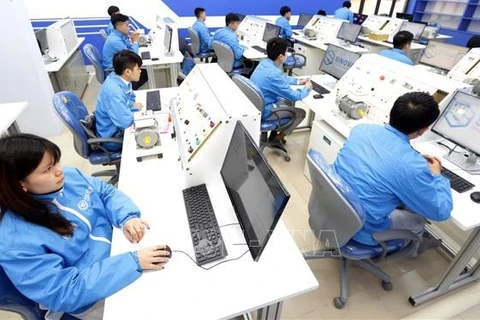HCM City (VNS/VNA) - As technology develops and demand keeps increasing in the property sector, proptech will develop in a similar way to fintech, experts have said.
Proptech, or property technology, has developed strongly in Vietnam with many start-ups being launched and attracting investment from major players and many services being developed to meet market demand.
An expert from Savill Vietnam said there are certain reasons for the market’s rise: the country’s huge population, the problems it faces, which could be resolved by proptech, and Vietnamese people’s ability to use technology.
Hoang Duc Trung, a partner at VinaCapital Ventures, told Viet Nam News: “We believe proptech will develop in a similar way to fintech, that is, mostly based on how technology stacks are developed and evolve to resolve structural pain points and inefficiencies and positioned at the intersection of all market stakeholders.
“We think that the trendsetters and growth drivers will continue to be those companies that create and offer disruptive solutions that optimise and aggregate resources and financing, improve industry standards and customer experiences and ensure transparency and data security.”
He attributed the growth of the market to the strong economy, accelerating urbanisation and rising incomes which continue to drive demand in the property market.
“This growth is also fuelling digital transformation and the development of disruptive technology infrastructure, which is commonly known as ‘proptech’.”
According to Trung, proptech has gained ground in Vietnam in recent years, mostly thanks to the country’s young and tech-savvy population.
“Hundreds of proptech start-ups and traditional real state firms are aiming to leverage technology to improve their operations and competitive edge by providing effective solutions to enhance home buying, selling, renting, and living experiences.”
Some of the famous apps and proptech products in the market include Saas, Propzy, Go2Joy Vietnam, Citics, Homebase, and A.Plus Home.
They have successfully raised capital from foreign investors.
For instance, Propzy, a leader in the proptech industry and provides transparent online property services, raised 37 million USD.
Speaking about the reasons for investing in proptech, Doan Le Minh Tri, senior investment manager at VinaCapital Ventures, said: “We have been monitoring the development of the proptech sector and see its enormous potential, given the continuing growth of the real estate market and increasing digitisation trends.”
VinaCapital’s first investment in the sector was in Rever, which has built infrastructure to make the transaction process smoother. Its solution has outpaced the industry’s benchmarks related to data accuracy, the number of days a property is on the market and agent efficiency ratio.
More recently, VinaCapital Ventures invested in Homebase, which offers a rent-to-own financing option for millennials and the under-banked population to realise their home ownership goals.
Both companies are addressing long-standing pain points in Vietnam’s real estate market.
“We invested in these companies because they possess operational know-how blended with superior technology stacks that aim to serve homebuyers throughout the transaction journey, from screening and touring properties, conducting legal checks, arranging financing, and related paperwork that comes with owning a home.
“These services are provided affordably and transparently, enabling these companies to provide a higher level of customer service. We have a strong belief that Rever and Homebase are well-positioned to become leaders in their respective segments,” he told Viet Nam News.
The investment in the market has shown how promising it is.
Speaking about the efficiency of proptech, John Le, CEO and founder of Propzy Vietnam said: “Our sales guys are now on average bringing much more with much less, so our technology SAM has been a major influence because it has ensured certain business processes that otherwise cannot be done in any normal world because you cannot get 300 salespeople to collaborate.
“But this technology allows the sales team to be connected, engage with one another and collaborate to get the best outcome possible which is a real estate transaction from buyer to seller, an asset we have been able to enable our sales guys to perform at absolute best.
“We’ve seen glimpses of success in other developed markets where property buyers are able to make purchase decisions without physically visiting the properties; however in Vietnam, there's still a long way to go.
“Having said that, there is a silver lining in the cloud and that's the high-rise or condo market. As that segment of the property market grows relative to the overall market we can anticipate adoption of virtual touring and purchasing potentially happening sooner rather than later.”/.
Proptech, or property technology, has developed strongly in Vietnam with many start-ups being launched and attracting investment from major players and many services being developed to meet market demand.
An expert from Savill Vietnam said there are certain reasons for the market’s rise: the country’s huge population, the problems it faces, which could be resolved by proptech, and Vietnamese people’s ability to use technology.
Hoang Duc Trung, a partner at VinaCapital Ventures, told Viet Nam News: “We believe proptech will develop in a similar way to fintech, that is, mostly based on how technology stacks are developed and evolve to resolve structural pain points and inefficiencies and positioned at the intersection of all market stakeholders.
“We think that the trendsetters and growth drivers will continue to be those companies that create and offer disruptive solutions that optimise and aggregate resources and financing, improve industry standards and customer experiences and ensure transparency and data security.”
He attributed the growth of the market to the strong economy, accelerating urbanisation and rising incomes which continue to drive demand in the property market.
“This growth is also fuelling digital transformation and the development of disruptive technology infrastructure, which is commonly known as ‘proptech’.”
According to Trung, proptech has gained ground in Vietnam in recent years, mostly thanks to the country’s young and tech-savvy population.
“Hundreds of proptech start-ups and traditional real state firms are aiming to leverage technology to improve their operations and competitive edge by providing effective solutions to enhance home buying, selling, renting, and living experiences.”
Some of the famous apps and proptech products in the market include Saas, Propzy, Go2Joy Vietnam, Citics, Homebase, and A.Plus Home.
They have successfully raised capital from foreign investors.
For instance, Propzy, a leader in the proptech industry and provides transparent online property services, raised 37 million USD.
Speaking about the reasons for investing in proptech, Doan Le Minh Tri, senior investment manager at VinaCapital Ventures, said: “We have been monitoring the development of the proptech sector and see its enormous potential, given the continuing growth of the real estate market and increasing digitisation trends.”
VinaCapital’s first investment in the sector was in Rever, which has built infrastructure to make the transaction process smoother. Its solution has outpaced the industry’s benchmarks related to data accuracy, the number of days a property is on the market and agent efficiency ratio.
More recently, VinaCapital Ventures invested in Homebase, which offers a rent-to-own financing option for millennials and the under-banked population to realise their home ownership goals.
Both companies are addressing long-standing pain points in Vietnam’s real estate market.
“We invested in these companies because they possess operational know-how blended with superior technology stacks that aim to serve homebuyers throughout the transaction journey, from screening and touring properties, conducting legal checks, arranging financing, and related paperwork that comes with owning a home.
“These services are provided affordably and transparently, enabling these companies to provide a higher level of customer service. We have a strong belief that Rever and Homebase are well-positioned to become leaders in their respective segments,” he told Viet Nam News.
The investment in the market has shown how promising it is.
Speaking about the efficiency of proptech, John Le, CEO and founder of Propzy Vietnam said: “Our sales guys are now on average bringing much more with much less, so our technology SAM has been a major influence because it has ensured certain business processes that otherwise cannot be done in any normal world because you cannot get 300 salespeople to collaborate.
“But this technology allows the sales team to be connected, engage with one another and collaborate to get the best outcome possible which is a real estate transaction from buyer to seller, an asset we have been able to enable our sales guys to perform at absolute best.
“We’ve seen glimpses of success in other developed markets where property buyers are able to make purchase decisions without physically visiting the properties; however in Vietnam, there's still a long way to go.
“Having said that, there is a silver lining in the cloud and that's the high-rise or condo market. As that segment of the property market grows relative to the overall market we can anticipate adoption of virtual touring and purchasing potentially happening sooner rather than later.”/.
VNA
























